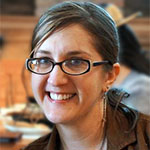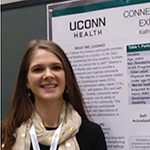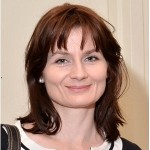 Professor Michael Ego was recently interviewed on the Golf Channel by Jimmy Roberts in a piece entitled, “How sports can help those with memory loss”.
Professor Michael Ego was recently interviewed on the Golf Channel by Jimmy Roberts in a piece entitled, “How sports can help those with memory loss”.
Watch the video here https://www.golfchannel.com/video/roberts-how-sports-can-help-those-memory-loss/
Author: Janice Berriault
Linda Halgunseth Co-Author in SRCD Latino Caucus Brief article
 Associate Professor Linda Halgunseth co-authored an SRCD Latino Caucus Brief on separating children from their parents at the border. Read the article entitled, “The Science is Clear: Separating Families has Damaging Psychological and Health Consequences” in UConn Today.
Associate Professor Linda Halgunseth co-authored an SRCD Latino Caucus Brief on separating children from their parents at the border. Read the article entitled, “The Science is Clear: Separating Families has Damaging Psychological and Health Consequences” in UConn Today.
HDFS faculty and grad student present their work at ISSBD conference
HDFS faculty and graduate students presented at the 25th Biennial Meeting of the International Society for the Study of Behavioural Development (ISSBD). The event took place in Gold Coast, Queensland, Australia on July 15-19, 2018. Here is a list of the participants.
Grads receive fellowships from Wood/Raith Living Trust


HDFS graduate students, Gonul Kuscul and Samantha Lawrence, are among the first cohort of UConn students to receive summer fellowships from the Wood/Raith Living Trust. This was a very competitive internal award to support work related to gender identity. Congratulations Gonul and Sam!
Study with the Human Rights Campaign featured in the Washington Post


Professor Rebecca Puhl and Assistant Professor Ryan Watson‘s study with the Human Rights Campaign was recently covered in the Washington Post & the Boston Globe, among other outlets.
HDFS faculty newly promoted and tenured




The College of Liberal Arts and Sciences (CLAS) acknowledged four HDFS faculty who received tenure this year: Dr. Alaina Brenick, Dr. Linda Halgunseth (both were promoted to Associate Professor), Dr. Marlene Schwartz, and Dr. Rebecca Puhl.
Kaleigh Ligus receives SGS Student Scholarship Award
 HDFS Graduate Student, Kaleigh Ligus, received a Southern Gerontological Society (SGS) Student Scholarship Award to attend this conference where she presented her research.
HDFS Graduate Student, Kaleigh Ligus, received a Southern Gerontological Society (SGS) Student Scholarship Award to attend this conference where she presented her research.
Eminet Gurganus receives a Social Networks and Health Fellowship
 Congratulations to Eminet Gurganus (HDFS graduate student), who just received a Social Networks and Health Fellowship. The fellowship will provide funding for her to attend the Social Networks and Health workshop sponsored by The Duke Network Analysis Center (DNAC) and the Duke Population Research Institute, and will also match her with a mentor to work on a specific project together.
Congratulations to Eminet Gurganus (HDFS graduate student), who just received a Social Networks and Health Fellowship. The fellowship will provide funding for her to attend the Social Networks and Health workshop sponsored by The Duke Network Analysis Center (DNAC) and the Duke Population Research Institute, and will also match her with a mentor to work on a specific project together.
HDFS professors present at CLAS Diversity Research Poster Session



Assistant Professor Alaina Brenick, Associate Profesor Annamaria Csizmadia, and Assistant Professor Linda Halgunseth presented at the CLAS Diversity Research Poster Session.
Jia Li Liu awarded the Calvin J. Li Postdoctoral Fellowship
 Doctoral student Jia Li Liu has been awarded the Calvin J. Li postdoctoral fellowship at the University of Maryland, to begin in fall 2018. The fellowship supports research about the unique social challenges facing Asian American children. The position also includes teaching in the Asian American Studies Program at The University of Maryland and developing community-based lectures and parenting workshops. Jia Li is currently writing up her dissertation, based on research about children’s shyness, that she carried out in Hong Kong last year as a Fulbright Fellow. She has also earned a Graduate Certificate in Culture, Health and Human Development through coursework and research in China.
Doctoral student Jia Li Liu has been awarded the Calvin J. Li postdoctoral fellowship at the University of Maryland, to begin in fall 2018. The fellowship supports research about the unique social challenges facing Asian American children. The position also includes teaching in the Asian American Studies Program at The University of Maryland and developing community-based lectures and parenting workshops. Jia Li is currently writing up her dissertation, based on research about children’s shyness, that she carried out in Hong Kong last year as a Fulbright Fellow. She has also earned a Graduate Certificate in Culture, Health and Human Development through coursework and research in China.